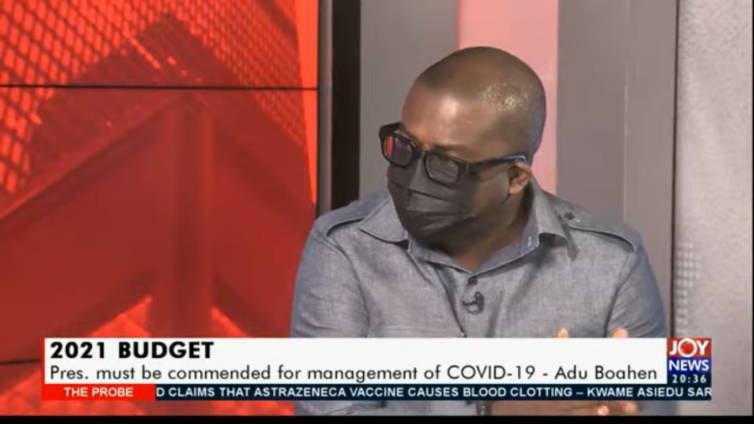The President’s Representative at the Finance Ministry, Charles Adu-Boahen says the 2021 budget which was presented to Parliament on Friday is anchored on debt sustainability.
Speaking on JoyNews’ The Probe Sunday, Mr Adu-Boahen indicated that government lost a huge amount in revenue mobilisation made additional expenditure due to some of the interventions it implemented to cushion Ghanaians amidst the Covid-19 pandemic
Thus, the government’s decision to use an immense portion of the revenue that is expected to be generated this year on settling debt before the country is caught in a debt trap.
“This is the first year that interest expense or payment will exceed compensation as the single largest item on the budget. In fact out of the 70 billion domestic revenue about 35 billion is for interest payment; so that is exactly 50 per cent. About 30 billion is on compensation so if you add the two that is 65 billion and that eats up your whole 70 billion in domestic revenue.”
The former deputy Minister told host Emefa Apawu that the global health crisis cost Ghana an amount of ₵25 billion, therefore, government had to resort to borrowing which has also raised the country’s debt to GDP.
“Covid-19 created a 25 billion financial gap between a shortfall in revenues and additional expenditure. So in order to fill the gap, we had to revise our deficit and take it up from 4.8 to 11.4 so we ended up borrowing a lot more than anticipated so by the end of the year we had a debt to GDP of about 76.1%.
“The 76.1% debt to GDP on its own is not scary. I think South Africa was projecting about 88% the UK just came out with theirs and they were about 97 or 98% in terms of where their debt to GDP. So everybody was getting highly leveraged because of the Covid-19 pandemic so it wasn’t unique,” he stated.
“What was scarier in our case was that we will get into a debt trap where you borrow to pay your debt. So our ability to service debt is what was challenging so we realized that we needed to anchor on debt sustainability.”
The President Representative further debunked assertions that government is shifting the burden on the ordinary Ghanaian.
In his view, Ghana’s GDP debt is a shared burden and urged all and sundry must support government as its gears the country towards a post Covid-19 recovery.
“I don’t think these [new] taxes are really hitting the poor. They are not income taxes, they are consumption taxes. Somehow we have to find a way to share the burden.
“We can’t borrow anymore, we have borrowed to the hilt so we have took at the revenue side of the equation that is why we are looking at some tax measures and we have really thought through this so that the burden is not so much that we cannot share [as a people],” he said.
Latest Stories
-
Video: Hitz FM’s Rep Ur Jersey ends in style as fans jam to afterparty beats
8 hours -
Hitz FM’s Rep Ur Jersey turns electric as PSG thrashes Inter 5–0 in Champions League showdown
8 hours -
PSG thrash Inter Milan to win first-ever Champions League title
8 hours -
Aviation Social Centre packed as UCL Finale kicks off at Hitz FM’s Rep Ur Jersey
9 hours -
Photos: Fans win big at ‘Rep Ur Jersey’ as sponsors reward game participants with exciting prizes
9 hours -
Australia to increase contribution to UN Peacebuilding Fund to $15m annually – High Commissioner
9 hours -
Dr. Angela Dwamena-Aboagye named MTN Hero of Change for championing women and children’s rights
10 hours -
From Morocco to Botswana – Africans turn to trusted media and experts for climate change information
10 hours -
Mahama announces Labour Export Programme
10 hours -
Prof. Peter Atudiwe Atupare appointed Dean of University of Ghana School of Law
11 hours -
Goldbod is already doing wonders – Mahama praises CEO Sammy Gyamfi
11 hours -
Mahama promises attractive cocoa price in August, pledges 200,000 hectare boost to sector
11 hours -
UHAS Council Chairman Prof. Kodzo Gavua urges graduates to serve with passion, integrity, and innovation
13 hours -
Dr. Charisa Ogbogbo becomes first female professor in Mathematical Sciences at UG
13 hours -
Communication Ministry assures data price cuts as TELCOS prepare to reduce costs soon
13 hours

